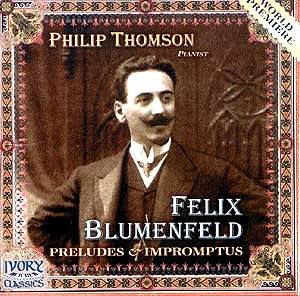BLUMENFELD Complete Preludes &
Impromptus
 Philip Thomson
(piano)
Philip Thomson
(piano)
 Ivory Classics 71002.
75'02"
Ivory Classics 71002.
75'02"

Felix Blumenfeld (1863-1931) was a notable Russian composer-pianist
who published his 24 Preludes Op. 17, loosely based upon Chopin's, in 1892,
well before those of Scriabin, Arensky, Cui and Rachmaninov appeared. His
music used to be very popular, but this is claimed as the first recording
of the pieces included; Blumenfeld's dazzling Study for the left hand
was a favourite encore piece, which eclipsed everything else he had written.
Whilst not strikingly original, and obviously influenced by Chopin &
Liszt, these Preludes and six Impromptus are nonetheless thoroughly enjoyable
here. The Preludes are arranged in an orderly fashion through the cycle of
keys and they alternate moods. Some of them have unusual harmonic turns,
though many are more conventional. The nineteenth prelude is an improvisation
upon Isolde's Liebestod.
Blumenfeld had been famed for his lyrical singing tone and colourful virtuosity
and these qualities are matched by his young Canadian disciple. Philip
Thomson's intelligent interpretation is less surprising when we learn
that his multiple gifts included playing the violin in the National Youth
Orchestra and winning championships in table tennis and chess! He has an
easy style, gentle rubato underpinned by firm underlying pulse, pellucid
tone, brilliance when required. The recordings were made in a leisurely fashion
over 6 days during a year's span between November 1998 and October 1999.
The sound quality is excellent and the recording owes its success in considerable
measure to the Baldwin piano, prepared by Edd Kolakowski, far more suitable
a choice than a typical Steinway, which might have emphasised brilliance
unduly. Thomson has also recorded Liszt for Naxos, and for Hungaroton the
Liszt concertos, including the rediscovered De Profundis.
Reviewer
Peter Grahame Woolf

